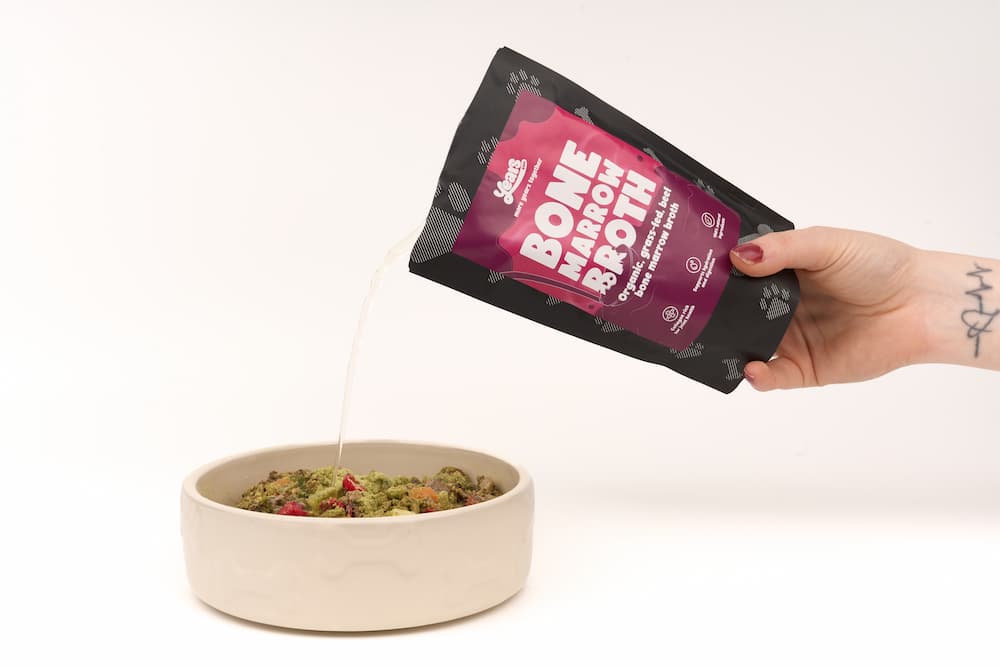
Is Bone Broth Good For Dogs?
|
|
Wondering if bone broth is good for your dog?
This nutrient-rich liquid, is gaining popularity for its potential health benefits, from supporting joint health to tempting picky eaters to consume their food.
It's important to ensure your dog is consuming it safely and how to feed to your dog.
Here's all you need to know about bone broth for dogs.
Dog bone broth is the liquid stock created when bones are boiled in water over a period of 12-24 hours.
During the cooking process, the nutrients pass from the bone marrow into the water so that when the bones are removed, the remaining stock is full of vitamins and minerals.
Chicken and beef broths are the most commonly available.
The feeding of bone broth to dogs is on the rise, particularly bone broth for dogs in the UK, as pet parents look for ways to boost their dogs’ health and nutrition.
If you’re wondering ‘What is bone broth good for?’ you might be surprised to learn there are several benefits of bone broth for dogs.
If you’re considering chicken or beef bone broth for dogs, benefits include improved digestion and better joint health.
Bone broth also contains amino acids, collagen, and minerals like calcium, magnesium, and phosphorus, which can help keep your dog’s muscles, heart, liver, and other organs healthy while also boosting their immune system and reducing inflammation.
If your dog is a fussy eater, a bone broth topper for dogs can help to encourage their appetite and hydration by making their food and drink more appealing.
If you want more advice about what to do if your dog is picky or off their food, visit our blog, Why is my dog not eating?
Even though there are plenty of bone broth benefits for dogs, there are also some potential risks to be aware of.
So, can dogs have bone broth safely?
Yes, in most cases, as long as you avoid certain ingredients, but every dog is different, and bone broth might not be suitable for dogs with food allergies or sensitive guts.
Beef and chicken bone broth for dogs is usually safe as long as any fat has been removed because this may cause a stomach upset or pancreatitis.
The broth shouldn’t contain any spices, seasoning, or extra ingredients because these could be toxic or cause vomiting or diarrhoea.
Finally, ensure the broth doesn’t contain any bone remnants because these could get lodged in your dog’s mouth, oesophagus, stomach, or gut, causing damage, irritation, or a blockage.
Find out more about why chicken bones (and other bones) are a health risk for dogs in our blog, Why you should never give your dog cooked chicken bones .
Whenever you introduce something new into your dog’s diet, it’s important to do it gradually.
First, give your dog a tiny amount, just a teaspoon measure, and see how they react. If they like it and they don’t develop any vomiting or diarrhoea or other concerning signs within 24 hours, you’re safe to give them a little bit more.
Bone broth is suitable to give as a topper on each meal, but it’s important to factor these calories into their daily allowance so that they don’t become overweight.
To be certain, check the label and use the feeding instructions as a guide, monitoring your dog’s weight closely and removing some of their regular dog food as needed.
This can be used as a nutrient-rich liquid diet if your dog is unwell and can’t eat solids, but it’s not a nutritionally complete diet.
Bone broth can also be a nutrient-rich addition to their current meals to help them recover from illness, support hydration and improve their immune system.
However, it shouldn’t be fed exclusively in the long term, only as an accompaniment to your dog’s nutritionally balanced and complete dog food.
Bone broth is packed full of nutrients for dogs and their digestive health.
This can be added to your dog's current meals to complement their nutrition or used in temporary circumstances if you dog is having issues digesting solid food or with their hydration.
But it needs to be offered safely and conveniently.
To avoid small bone fragments, extra ingredients, and a short fridge life, it is always best to use a trusted, commercial bone broth specifically made for dogs such as our Bone Marrow Broth.
Years Bone Marrow Gravy is made with 100% organic bones and carrot making for a collagen-rich broth that supports joint health, hydration and digestion.
Thankfully, you can easily add a bone broth topper as an extra to your Years subscription in your account.
New to Years? Take our quiz and find out the exact nutritional requirements your dog needs to live a happier and healthier life.
Bone broth is packed full of protein, so it can help dogs gain weight. However, it should only be given alongside nutritionally complete dog food.
Anything new in your dog’s diet can give them diarrhoea, and if your dog has food allergies or a sensitive gut, bone broth might not agree with them. That’s why it’s important to start by offering a small amount to check that they won’t become unwell.
A dog can have a small amount of bone broth on top of every meal as long as they haven't reacted to eating bone broth in the past. Remember to adjust the amount of their regular food accordingly so that they're not getting too many calories.

